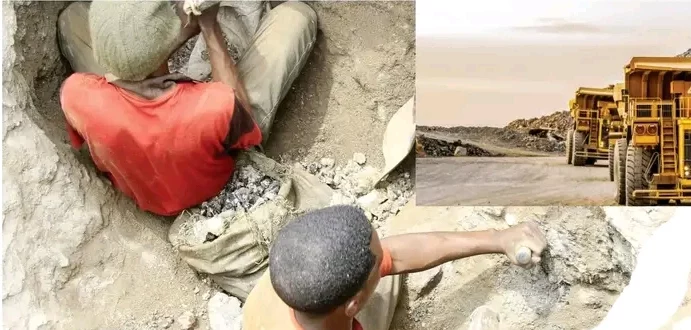Although Nigeria’s mining sector has the potential of fetching the federal government N4trillion ($9 billion) annually, as estimated by the executive director, Global Rights, Abiodun Baiyewu, the sector seems to largely benefit criminal elements. As a result of the activities of the criminals, lives and properties are lost, and the country has had to expend huge military resources to troubled spots, which is a further drain on the economy.
Experts lay most of the blame on the government’s nonchalant approach to taking control of the resources, which statutorily belongs to the federal government.
Section 44 (3) of the Nigerian Minerals and Mining Law of 1999 provides that ownership and control of all minerals in Nigeria is vested in the federal government, which is mandated to manage such natural resources in a manner as may be prescribed by the National Assembly.
Any operator without a licence from the government is deemed to be carrying out illegal activities and such person may be arrested and tried at a Federal High Court.
Section 1(1) of the Nigerian Minerals and Mining Act, 2007 equally gives the federal government ownership and absolute control over all mineral resources in the country, including the mining process. In the North West and other regions, including the Niger Delta, it has been alleged that state governments have demonstrated a lackadaisical attitude toward policing and regulating mineral resources because they consider them federal property. Therein lies a problem.
The situation shows the deep-rooted structural problem facing Nigeria’s fiscal federal system which favours the central government, but inadequate in monitoring and controlling the activities of the sector, thus making it a liability in terms of security of lives and property. Criminal elements take advantage of the loopholes in the government’s nonchalance.
Investigations showed that there is a link between those who sponsor illegal mining and those who fund banditry and cattle rustling in mining communities. Furthermore, the minister of mines and steel development, Olamilekan Adegbite, had indicated in the past that some politicians often put pressure on the government to free Chinese nationals and locals arrested for illegal mining, a development that he said lends credence to the existence of a powerful network of organised criminals.
And the ground for illegal mining in Nigeria is fertile. The widespread illegal mining activities in the country have been blamed on the federal government’s inability to adequately regulate the industry, a report commissioned by Global Rights has stated.
The report held that illegal mining activities in the country are being fuelled by the failure of government to put in place measures to curb the activities of illegal miners.
According to a researcher, Nana Nwachukwu, other factors promoting illegal mining activities in the country to include: poverty, high cost of formalizing operation, high criteria required for formalising operation, entitlement to resources and the lucrative nature of illegal mining.
Ayo Peterson of The Social Conscience Group, and a social affairs commentator said there was a deliberate inaction on the part of government officials to ensure that there are no adequate data in the industry. He pointed out that the government was too far away from the industry to adequately monitor it.
“Artisanal mining makes up about 70 per cent of all mining activities in West Africa, and in Nigeria it is more than 80 per cent. The sector itself, the artisanal mining in particular is not strongly regulated. Most of the laws we have in Nigeria have less than 10 per cent of the provisions that pertain to artisanal mining. There is a lot of confusion in the industry about what is illegal mining, unregulated mining and informal mining. Those are terms that have come up overtime and it is really about what level of responsibility the government is willing to take for itself.
“Nigeria is losing about $9 billion to leakages in the mining sector annually and a good chunk of the $9 billion is from artisanal mining,” he said.
Peterson noted that “institutions that govern artisanal mining are not strong enough to fulfill their duties.” He stated that the government should provide strong regulations and access to funding for the sector.
However, an official of the Federal Ministry of Mines and Steel Development, Pius Kelikume, stated that the government was doing its best to implement the laws governing the sector.
He stated that while the government has mining officials across the 36 states of the federation and the Federal Capital Territory, it impossible to monitor illegal mining activities across the country.
The involvement of foreign corporations in illegal mining is another sign of poor governance. David Yusuf, a director at the Centre for Transparency said it showed the ‘failure of regulatory oversight and gross inadequacies in the enforcement of regulatory compliance by respective governmental agencies.’
Illegal miners often front for politically-connected individuals who collaborate with foreign nationals and corporations to sell gold. The mineral is routinely smuggled to Dubai through neighbouring Niger and Togo.
To address this challenge, a security expert at King’s Guard Security, Paul Ojake, told NATIONAL ECONOMY that Nigeria needs to deal with foreign illegal miners through diplomatic channels, and ensure security operatives do not cooperate with members of organised crime in the country.
However, Mohamed Adamu, a lawyer, said to address the challenge, the mining act should be amended to place ownership and control of mineral resources on state governments rather than the federal government. Nigeria also needs to deal, through diplomatic channels, with the involvement of foreign nationals and corporations in organised crime in the country.





